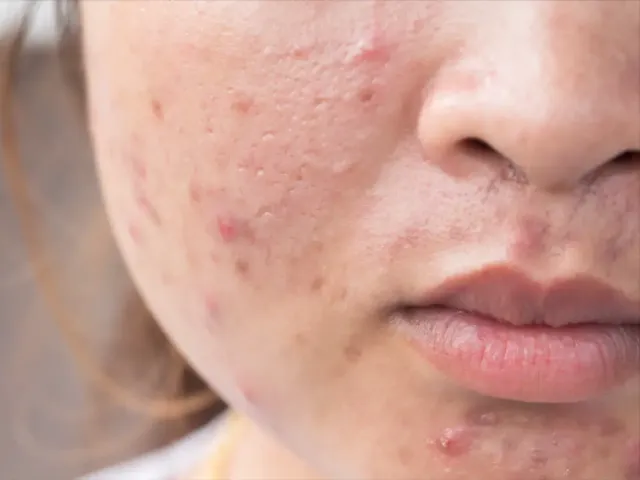Acne can wreak havoc on one's self-esteem, causing distress and frustration. Many individuals, particularly teenagers, struggle with acne during their formative years, and its impact on their confidence can be profound. While there are numerous factors that contribute to the development of acne, one vitamin deficiency stands out as a major player. In this article, we will delve into the connection between acne and vitamin deficiency, providing valuable insights into how addressing this deficiency can help combat acne effectively.
Understanding the Mechanism of Acne
Acne is a multifaceted skin condition characterized by various factors working together. At the core of acne development is the sebaceous gland, responsible for producing oil, also known as sebum. In acne-prone individuals, the sebaceous gland becomes inflamed and enlarged, producing an excess of oil. This oil overproduction, combined with the presence of certain bacteria, triggers inflammation and manifests as redness and pimples. Additionally, blackheads and whiteheads can also be present.
Hormonal Imbalances and Acne
Hormonal shifts play a significant role in acne development. During puberty, the sudden surge of androgens can trigger acne breakouts. Similarly, individuals with polycystic ovarian syndrome (PCOS) experience increased androgens, leading to acne as a symptom. While hormones are a key factor in acne, there is another vital element to consider – insulin.
The Role of Insulin and Carbohydrates in Acne
High levels of insulin, often caused by a diet rich in carbohydrates, can exacerbate acne symptoms. Consuming excessive carbs leads to elevated insulin levels, which, in turn, increase androgen production. This hormonal imbalance contributes to the development of acne. Moreover, the frequency of eating, particularly snacking, can also trigger insulin spikes. Therefore, reducing carb intake and implementing intermittent fasting can significantly improve acne symptoms.
The Power of Vitamin D in Acne Management
One crucial vitamin deficiency that often goes unnoticed in individuals with acne is vitamin D deficiency. Vitamin D plays a vital role in regulating the bacteria involved in acne development. When deficient in vitamin D, individuals may lack control over acne-causing microbes, leading to persistent breakouts. Increasing vitamin D intake can have a profound impact on acne management.
Vitamin D and Oil Production
By increasing vitamin D levels, individuals can experience a reduction in oil production. This decrease in sebum production helps minimize inflammation, swelling, and enlargement of the sebaceous gland. Additionally, the cells responsible for sebum production are influenced by vitamin D3, further contributing to oil regulation.
Vitamin D and Hormonal Balance
Vitamin D deficiency is often prevalent in individuals with PCOS, who already experience imbalances in androgen levels. Supplementing with vitamin D can aid in regulating androgens, potentially alleviating acne symptoms. It is crucial to note that the majority of the population, especially teenagers, are deficient in vitamin D due to limited sun exposure and dietary factors.
Factors Contributing to Vitamin D Deficiency
Several factors can lead to vitamin D deficiency, including a high carbohydrate diet, obesity, gut issues, and darker skin pigmentation. Consuming a high-carb diet and elevated blood sugar levels can deplete vitamin D. Similarly, obesity is associated with lower vitamin D levels, while gut issues can impair the absorption of this essential vitamin. Furthermore, individuals with darker skin have a more challenging time converting sunlight into vitamin D.
Addressing Vitamin D Deficiency for Acne Relief
To effectively combat acne by addressing vitamin D deficiency, several strategies can be implemented:
Supplementing with Vitamin D: Taking approximately 20,000 IU of vitamin D3 daily can help replenish deficient levels and support acne management.
Adopting a Low Carb Diet: Reducing sugar and refined carbohydrate consumption can significantly improve acne symptoms. These food choices contribute to bacterial growth associated with acne, making a low carb diet essential.
Implementing Intermittent Fasting: By eliminating snacking and practicing intermittent fasting, individuals can reduce insulin levels and improve hormonal balance, positively impacting acne management.
Avoiding Excessive Scrubbing: Over-scrubbing the skin can strip away beneficial bacteria and exacerbate inflammation. Avoid the urge to over-sterilize or scrub the skin excessively.
Incorporating Vitamin D-Rich Foods: Consuming foods such as cod liver oil and fatty fish like salmon and halibut can provide additional vitamin D and other beneficial nutrients to support healthy skin and combat acne.
Conclusion
Acne can be a challenging condition to manage, but understanding the role of vitamin deficiencies, particularly vitamin D, can provide valuable insights and effective solutions. By addressing vitamin D deficiency through supplementation, dietary changes, intermittent fasting, and gentle skincare practices, individuals can take significant steps towards clearer, healthier skin. Embracing these strategies alongside a holistic approach to acne management can bring about long-lasting relief and boost self-esteem.
Remember, addressing the top vitamin deficiency associated with acne is just one piece of the puzzle. Consult with a healthcare professional for personalized guidance and explore comprehensive skincare routines to optimize your journey towards clear, radiant skin.

